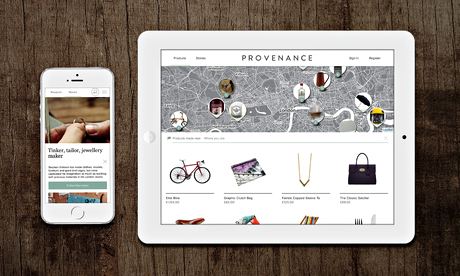
It was while studying manufacture engineering and the supply chains involved that Cambridge graduate Jessi Baker, 29, was struck by the true stories behind the products we buy. With a keen focus on the power of social media and transparency, Baker co-founded Provenance in 2013, a social enterprise aiming to give shoppers an idea of where products are made, what from and by who, with users able to question the details companies present on the site. Still in its infancy, Provenance already has 500 brands signed up before the launch of its beta site in June. Baker explains where the site is currently positioned and what comes next.
What inspired Provenance?
It's never made sense that I spend money on something and I know hardly anything about where it comes from. While studying I ended up visiting quite a few factories and I just had this stark realisation that there are people behind the things that we buy, not just systems. I felt there was a trend towards how we perceive value and having control over your supply [chain], then Facebook came along and for me it was like two things coming together; we buy things we know nothing about it and social media could change that.
Where is the information for each brand coming from?
Most of it is entered by the company itself or scraped from places like Open Corporate. We're looking to connect a few other APIs which is quite important because we're trying to make a pool of open data.
How are you cross-checking the information they give you?
The point is that the information is now in an open data format – it's challengeable – so you can ask a question or contribute and the public can challenge and hone that information. I have this Utopian idea that social media will mean that we can start to vet information and crowdsourced verification can become a reality in supply chains. The idea is that the site allows for dialogue. It's in its infancy so I think there's going to be a long way to go until that's a working machine.
Do people want more transparency these days?
Sceptics think that people just don't care, but I think given the choice people do. I think there are those who seek slightly more meaning in the products that they buy and want to know a little bit more, but I think it's going to be a while until it's the mainstream.
How do you think consumer attitudes have changed?
I think people look at things like the Bangladesh garment factory collapse and think "my God, we can't let that go on". I think in a hundred years' time we'll look back and think we were barbarians to buy into that kind of stuff. We buy into factory farmed meat and clothes made by slaves and that's ludicrous. I think the jury's out on whether there's a huge shift in consumer spending, but I think we'll need viable alternatives, which is the whole reason I started Provenance.
Are you aiming to get any big brands on board?
The plan is definitely to work with some big brands and I think that's where we could be most powerful, for larger brands to really get a grip on their supply chain and communicate it better. We currently focus on UK production and that means most of the products we have information on is quite luxurious. We're trying to embrace products that are a bit lower priced but the trouble is that is a lot of what is really well made by people who are paid fair wages is just a bit more expensive. I think it's about readjusting what value is and trying to get people to buy into good things rather than good marketing.

